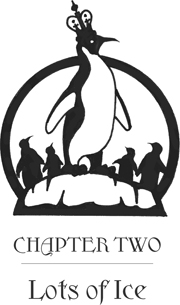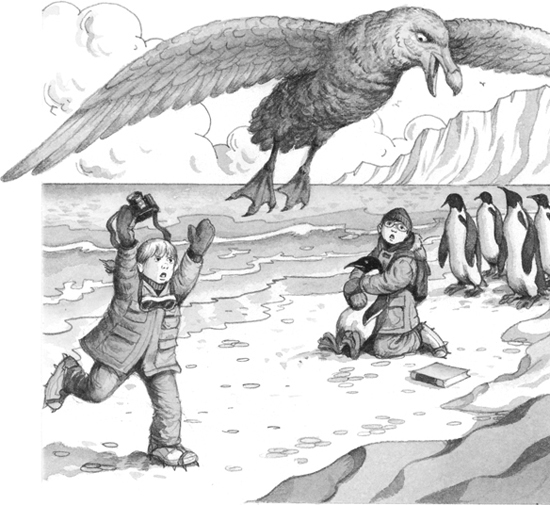

“Welcome to Antarctica,” said Annie.
Jack and Annie were bundled in cold-weather gear. They both wore snow pants, gloves, boots with spikes, and thick red parkas with hoods. Goggles covered their eyes, and wool masks covered their mouths and noses. A hiker’s backpack had replaced Jack’s own pack.
Jack felt trapped by all the gear. He pulled his mask down under his chin and pushed his goggles onto his forehead. Annie did the same. Their breath made clouds of mist in the freezing air.
“It’s really cold here!” said Jack. The wind stung his bare face and made his eyes water. But he kept his mask and goggles off as he looked out the window with Annie.
The tree house was on the ground. It was tucked under the overhang of an ice cliff near the ocean. Icy seawater sparkled in the sunlight. The shore was silent and deserted.
“It looks totally empty out there,” said Jack. “I still don’t get it—how do we find the Cave of the Ancient Crown here? No king or queen ever ruled Antarctica. In fact, no people ever lived here at all until explorers came in recent times.”
“Let’s get started and try to figure it all out,” said Annie.
“Not so fast,” said Jack. He pulled off his glove and opened their research book to the first chapter. He read aloud:
The continent of Antarctica is the coldest, driest, and windiest place on earth. Larger in area than the United States, it is a land filled with ice—ice cliffs, icebergs, ice sheets, ice shelves—
“Okay, lots of ice,” said Annie. “Got it. Let’s go.”
“In a minute.” Jack kept reading:
But Antarctica was not always a land of ice. Eons ago, it was part of a supercontinent scientists have named Gondwana. It had forests, flowers, and many animals, including dinosaurs. But no people ever lived there.
“See?” said Jack. “No kings, no queens, no crowns.”
“Yep, let’s go,” said Annie.
But Jack kept reading:
Over millions of years, Antarctica broke off from Gondwana and drifted south.
“Okay, I’m drifting now myself, Jack,” said Annie. “Byeee—” She climbed out the window and disappeared from the tree house.
Jack looked back at the book, but before he could read further, he heard Annie whoop with laughter. “Oh, wow! Jack, come look!” she yelled.
“What is it?” said Jack, closing the book.
“You won’t believe this!” said Annie. “You have to come see!”
Jack put his glove back on and pulled on his backpack. He folded the paper with Morgan’s rhyme and put it in his pocket. Then, clutching the research book to his chest, he climbed out of the window.
Jack followed the sound of Annie’s laughter beyond the tree house. On the frozen seashore was a group of penguins, grown-ups and babies. The grown-ups had orange streaks on their cheeks, puffy white chests, and black wings they held straight by their sides. The babies were fluffy balls of gray fuzz. All the penguins were waddling toward Annie. They rocked from side to side, taking funny little steps.
Jack burst out laughing. The big penguins looked like a committee of little men in black suits.
The group stopped in front of Annie and squawked at her.
“Hi, guys,” said Annie. “Glad to meet you!”
The penguins stared back at her with friendly curiosity.
“They’re so cool,” said Jack. He opened the book and found a picture that looked like the group of penguins around Annie. He read:
Emperor penguins are the tallest and heaviest of the penguin species and are also the most ancient. Over three feet tall, grown penguins can weigh up to ninety pounds. Researchers say the penguin’s closest ancestors lived 40 million years ago.
“Forty million years!” said Jack. “So what time have we gone back to? A million years ago? A thousand years ago?”
“I don’t know,” said Annie. “But I’ll take a picture of them for my family project. They look like a little family, don’t they?” She pulled her camera out of her pocket and aimed it at the penguins. “Smile, everyone.”
As Annie took a picture, a shadow moved over the ice. The penguins squawked loudly and clustered together.
Jack and Annie looked up. The shadow belonged to a giant bird circling above them. The bird was brownish gray with a long beak. It let out an eerie cry.
“What is that?” Annie asked with alarm.
“I’ll look it up,” said Jack. He flipped through the pages of their book to find a photo. “Here!” He read quickly:
Giant petrels are the vultures of Antarctica. They eat dead birds and animals. Sometimes they even attack young seals and pen—
“Oh, no!” cried Annie.
Jack looked up. The petrel was diving toward the penguins. It hit the smallest one with its wing and swooped back into the air.
The penguin squawked and waddled away from the group. The petrel spread its wide wings and dove again.
“NO!” Annie cried.
The petrel swooped away but circled back toward them.
Jack dropped the book and scooped up a handful of snow to make a snowball. Before he could throw it, the petrel attacked again. Jack leapt toward the small penguin. He fell on his knees and threw his arms around the fluffy little body.

Annie charged at the petrel. “Go! Get out of here!” she yelled, waving her arms.
The petrel cawed, then rose high into the sky and disappeared over the ice cliff.
Jack let go of the small penguin and stood up. The penguin peeped and waggled its head at Jack.
Jack laughed. “You’re welcome,” he said. “Now go back to your family. Go—”
He shooed the penguin back to the group. “All of you guys, back in the water now. You’ll be safer there. Go, go.”
The penguins squawked and flapped their wings as if saying good-bye. Then they waddled across the icy shore, taking quick, tiny steps toward the sea. One after another, they dove between cracks in the ice until they all disappeared.
“Bye, guys,” said Annie.
HONK!
“What’s that?” said Jack.
HONK!
“It sounds like some kind of horn,” said Annie.
“That’s weird,” said Jack.
“It’s coming from over there,” said Annie.
Jack picked up their book and followed Annie up the side of an icy slope. The metal spikes on his boots dug into the ice and kept him from slipping. When he and Annie reached the top, they looked down.
“Oh, man,” said Jack. “We haven’t gone back in time at all!”